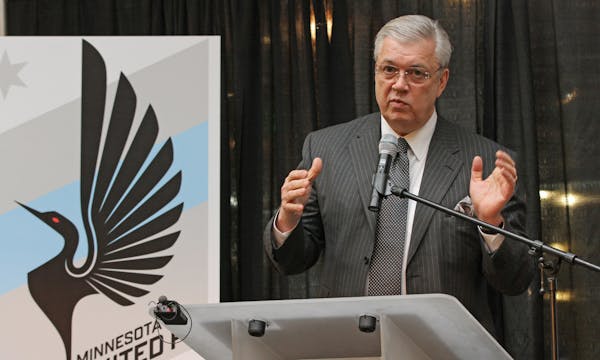Kevin Joseph became a Minnesota pro soccer fan in 2005, buying season tickets for the Minnesota Thunder and joining the "Dark Clouds" supporter group. He followed various iterations of local pro clubs for several years after that, even traveling to Tampa, Fla., in 2012 when Minnesota — then known as the Stars — lost its league championship match and was on the verge of losing much more.
"A bunch of us stood around in the parking lot after that, having a few drinks and wondering, 'Is this it? Is it over?' " Joseph said.
As it turned out, things were just beginning.
Minnesota, which was on the verge of folding as a franchise, was soon bought by Dr. Bill McGuire and renamed United FC. After two successful years in the North American Soccer League, where United has earned the reputation as a model franchise, the hard-core fans who stuck with Minnesota pro soccer through its darkest days will be rewarded Wednesday. Major League Soccer, the top league in the U.S., is expected to announce at a morning news conference that United and McGuire are getting an expansion franchise, most likely for the 2018 season.
"Hundreds of things all need to come together to make something take a big step forward," said Bruce McGuire, another longtime local soccer supporter (no relation to the United owner). "It's amazing when you see and feel that happening. I've been feeling that for a few years, but it's amazing how fast I'm feeling that right now."
A step up from the NASL to MLS means a higher level of soccer — played in a more centrally located stadium in front of far more fans, as long as United, which plays at the National Sports Center in Blaine, is able to make good on hopes to construct a stadium in downtown Minneapolis.
"I want everyone to know about this team I've loved for so long," Bruce McGuire said. "As a lifelong soccer fan, you'd dream about it. But I didn't think I'd see this day."
New faces
Five years ago, Minnesota barely drew more than 1,000 fans for home matches. Last year, it averaged over 5,000 fans. MLS average leaguewide attendance in 2014 was close to 20,000.
As United grows, die-hard supporters are curious about what the emerging fan base will look like. Bruce McGuire compared it to liking a band when it was playing in dimly lit bars and following its ascent to sold-out arena shows.
He said his greatest hope is that United is able to draw a "bigger variety of ethnicities" at games, while Joseph said he guesses there will be more younger fans. Both of them are likely right if city and league trends hold true.
The Twin Cities market is fertile in both of MLS's most successful demographics. At 44 percent, millennials (ages 18-34) are the largest MLS fan base. In Hennepin County, the population of young adults rose nearly 25 percent during the past seven years, one of the biggest gains in the nation. Latino fans make up 32 percent of the MLS fan base, the highest among U.S. pro sports leagues. The Latino population in the Twin Cities will more than double, from 168,000 residents in 2010 to 373,000 in 2040, according to Metropolitan Council estimates.
Seattle and Kansas City, two MLS markets Minneapolis would do well to emulate, have found success with younger crowds. Accepting that "convincing the older generation to give us a chance was not the best use of our efforts" was paramount to Sporting Kansas City's success, Chief Marketing Officer Andy Tretiak said.
Seattle also skewed younger, engaging millennials by marketing the club as something different from football's Seahawks or baseball's Mariners. Fans responded. The Sounders boast 109 consecutive sellouts and led MLS with an average draw of more than 43,000 fans, said Chief Operating Officer Bart Wiley.
The Sounders' efforts were rewarded by jersey sponsorship by Xbox, a Microsoft video gaming brand. Sporting Kansas City, meanwhile, partnered with local craft-beer brewer Boulevard Brewing and created a members club at the stadium.
"What we set out to do first was get them hooked on the experience," Tretiak said. "We wanted to get them to a game and then work on converting them to soccer fans."
Other factors
Jim Oliver, who is part of the executive board of the Dark Clouds — the supporter group survived team name changes and has around 300 members — said he knows a lot of fans who scoff at the perceived "second-tier" soccer of the United's level but would go to MLS games. But he added that a new stadium could be the most exciting part of all the recent talk, because that will help the fan base grow the most.
"When you look at the events we do around games, one of the hardest things for us is selling people on coming to Blaine," Oliver said. "Being in the urban core and being so accessible, it's going to bring a lot more people."
Joseph speculated it won't just be city-dwellers who would be attracted to the downtown location, as families living in the south metro — an especially long haul to the northern suburb of Blaine — will have an easier time "justifying going to a game."
Most of all, though, the longtime supporters are simply excited about the growth of the club they love.
"I would love it to be so many different kinds of people that you can't tell there's an 'average' soccer fan," Bruce McGuire said.
"The club has given die-hard supporters true belief, and I think they can do that with everyone."
